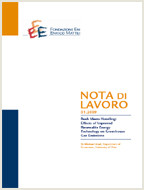The Empirics of Regulatory Reforms Proxied by Categorical Variables: Recent Findings and Methodological Issues

11.04.2017
Andrea Bastianin (University of Milan); Paolo Castelnovo (University of Milan); Massimo Florio (University of Milan)
B41, C20, C54, D04, L98
Econometrics, Policy Evaluation, Network Industries, Reforms
Economic Theory and Applications
Carlo Carraro
Some regulatory reforms do not change just a specific signal that can be represented by a quantitative continuous variable, such as a tax rate, a price cap, or an emission threshold. The standard theory of reform in applied welfare economics (going back to contributions by e.g. Ramsey, Samuelson and Guesnerie) asks the question: What is the marginal effect on social welfare of changing a policy signal? However, reforms such as privatization, unbundling or liberalization of network industries are often described by ‘packages’ shifting a policy framework. It is increasingly frequent in the empirical evaluation of such reforms to use categorical variables, often in polytomous form, for instance describing unbundling steps (vertical integration, accounting, functional, legal, ownership separation) on a discrete numerical scale, such as those proposed by the OECD and other international bodies. We review recent econometric literature evaluating regulatory reforms using such variables (40 papers) and we discuss some methodological issues arising in this context.
***
Suggested citation: Bastianin, A., P. Castelnovo, M. Florio, (2017), ‘The Empirics of Regulatory Reforms Proxied by Categorical Variables: Recent Findings and Methodological Issues’, Nota di Lavoro 22.2017, Milan, Italy: Fondazione Eni Enrico Mattei
